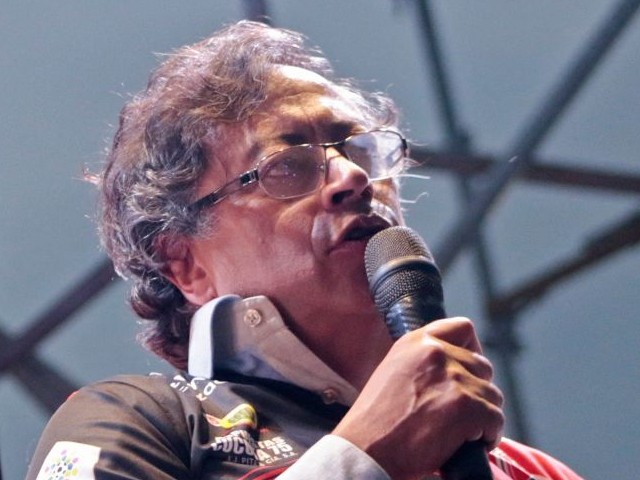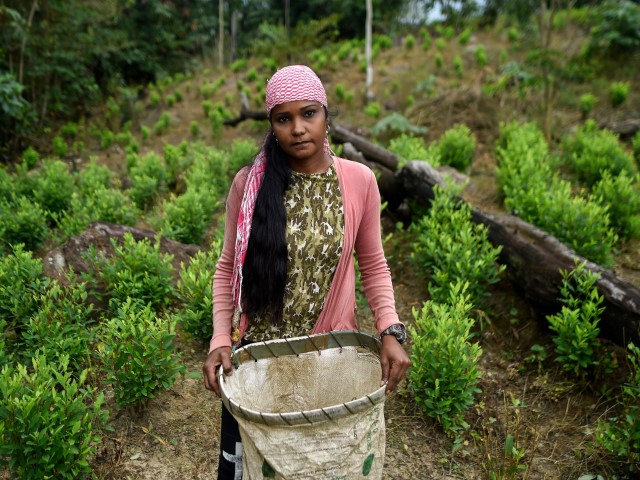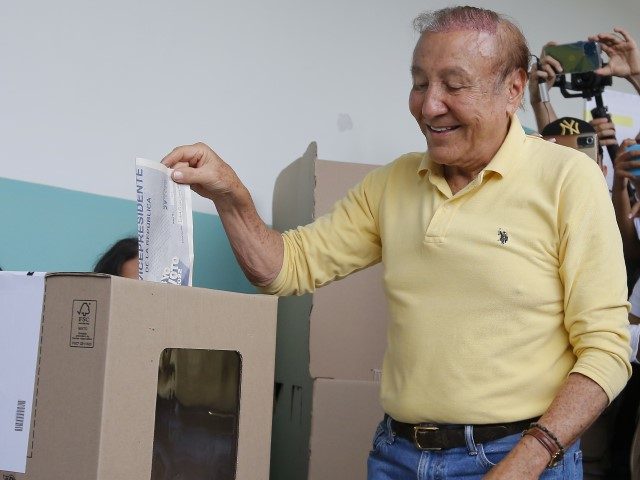The first series of polls out following Sunday’s presidential election in Colombia showed on Wednesday that much of the country is uniting against far-left candidate Gustavo Petro for next month’s runoff, backing elderly outsider businessman Rodolfo Hernández.
Colombia requires a runoff election if the first presidential election does not result in one candidate receiving over 50 percent of the vote. Petro won the first round on Sunday, but with only about 40 percent. Hernández defeated center-right establishment candidate Federico “Fico” Gutiérrez for the runner-up spot, meaning only Petro and Hernández will be on the ballot when Colombians return to the polls on June 19.

Colombian presidential candidate for the ‘Colombia Humana’ party and Historic Pact coalition, Gustavo Petro, speaks during a campaign rally in Cucuta, Colombia, near the Venezuelan border, on May 5, 2022. (SCHNEYDER MENDOZA/AFP via Getty Images)
Petro, the former mayor of the nation’s capital, Bogotá, is a far-left socialist and former member of the M19 terrorist guerrilla group, an organization he has publicly defended despite Colombia’s decades-long struggle against Marxist terrorist violence. Among Petro’s campaign promises are to end the war on drugs and to end programs designed to stop farmers from growing coca crops. Petro has said in the past that fossil fuels and sugar are worse “drugs” than cocaine.

Naikelly Delgado, 36, a Venezuelan migrant working as a “Raspachin” (farmer collector of coca leaves), poses for a picture at a coca plantation in the Catatumbo region, Norte de Santander Department, in Colombia, on February 9, 2019. Many Venezuelan who fled their country stopped being workers, taxi drivers, fishermen or sellers to collect the leaf that is used to make cocaine, an illegal activity that they had barely heard about and that tears them physically and morally. (LUIS ROBAYO/AFP via Getty Images)
Hernández is running a non-ideological anti-corruption campaign, condemning establishment powers and asserting that Colombia needs new blood in its halls of power. While receiving support from the Colombian right, Hernández is not an ideological conservative and has, among other campaign promises, vowed to re-establish diplomatic relations with socialist Venezuela. He is running under a coalition called the “League of Anti-Corruption Governors” despite having left the mayorship of Bucaramanga after being investigated over an alleged conflict of interest while in office. Hernández left the mayorship in 2019 and is better known as an engineer in the construction industry.
Colombia has traditionally enjoyed a conservative voter base and has never elected a far-left president. The past three presidents – incumbent Iván Duque, Juan Manuel Santos, and Álvaro Uribe – have all come from the same conservative political coalition, now best represented in Uribe’s Democratic Center party.
A tracking poll published Wednesday by the broadcaster La FM found that 52 percent of voters support Hernández currently, compared to 44 percent of voters going to Petro. Another 2.7 percent said they would file a blank vote, leaving only a very small sliver of the population undecided.
Similarly, the pollster Tracking Presidencial revealed in its publication on Wednesday that 52 percent of respondents support Hernández while 45 percent support Petro and three percent intend to submit a blank vote, nearly identical results to the La FM poll.
Tracking Presidencial also asked voters who they thought would win. The same number, 52 percent, said Hernández, but only 40 percent believed Petro would win.
The Wednesday polls follow much closer results published on Tuesday by the National Consultancy Center. That organization’s survey found the two candidates in a statistical tie: 41 percent supporting Hernández and 39 percent supporting Petro, with a 2.8 percent margin of error.
Given Petro’s polarizing politics and his high name recognition – Petro lost to President Duque in 2018 – efforts to court voters who supported other candidates will probably be more effective for Hernández than trying to win over Petro voters. Oscar Jahir Hernández (no stated relation), the Hernández campaign manager, told Colombian newspaper of record El Tiempo that the 77-year-old candidate was relying on galvanizing young voters who sought change in the country after three successive presidents from the same political clique (Santos and Duque are both Uribe proteges).
Many of those voters are in Antioquía department (the technical name for state-level divisions), the home of Álvaro Uribe and a conservative stronghold. Gutiérrez, the Uribe candidate, won Antioquía on Sunday with 49 percent of the vote. Uribe supporters tend to be aggressively anti-Petro, political analysts told El Tiempo, in part because Democratic Center has its roots there. Antioquía is also home to Medellín, once the center of the cocaine trafficking world under Pablo Escobar – a city that has spent decades trying to rebuild after largely subduing the cartels whose voters may be sensitive to Petro downplaying cocaine as a less dangerous drug than coal or sugar.
“With the youth team and municipal teams, we traveled to the cities, to the small towns making up working groups, which turned out to be a success,” Hernández, the campaign manager, told El Tiempo. “When we arrived at the parks, we called the Rodolfo supporters to organize them in groups and these groups are the ones who achieved the high voter rates.”
The campaign manager added that the campaign groups are made up of volunteers who often organize on social media: “We grab a cup of coffee and build these working groups and in a voluntary way they begin to spread the message.”
El Tiempo noted that Hernández’s campaign party on Sunday was clearly geared towards a young audience, featuring loud electronic and reggaeton dance music that volunteers shouted an impromptu slogan over: “With the old man, always!”
Petro appeared uninterested in vying for Gutiérrez voters in his victory speech on Sunday, calling his first round win proof of the demise of the Uribe establishment.
“A period has ended. An era has ended. It ended, poorly in the middle of cheating, but it ended,” Petro said, without elaborating on who he was accusing of cheating. Petro described the choice between himself and Hernández as that between “suicide or advancement.”

COMMENTS
Please let us know if you're having issues with commenting.